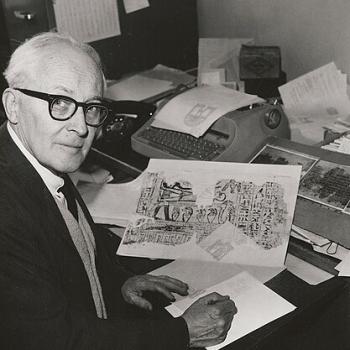Editor's Note: This article is authored solely by Marc Gafni.
One of the great teachings of the Integral Consciousness, which informs the emergent World Spirituality, is that frameworks matter.
The old world of the great traditions understood this very well. The framework is the metanarrative, the big picture or worldview, the Great Story through which we interpret our experience.
To date in history there have been three primary Great Stories. The premodern story was the story of simplicity, what I would call "First Simplicity." In terms of depth and interior enlightenment, this story was anything but simple in the simple-minded sense of things. Instead, it was the greatest interior view of the depths of the kosmos ever disclosed by the great human faculty of perception—the eye of the spirit.
It was nonetheless simplicity because, in large part, it claimed to have clear-cut answers to many of the great questions of Who we are, Why we are here, and Where we are going. [In large part, but not entirely. Within the premodern great traditions there were always voices of spirit that reached beyond the premodern simplicity and offered significant visions of spirit; these were not only profound but reached beyond ethnocentricity into the world centric and even kosmocentric orientations. It is these voices that we need to recover, reconstruct, and evolve as the foundation of an evolutionary world spirituality.] Particularly it claimed to offer clear and simple explanations of why human beings suffer or, said slightly differently, why bad things happen to good people. The Story was painful but simple. Suffering was a direct and clear part of the divine plan, which human beings—if they looked deeply enough—were capable of understanding.
The Great Story of the old traditions was rejected by modernity and postmodernity. The profound simplicities were undermined as humankind found itself living in vast complexity. First Simplicity was replaced by a new complexity.
Modernity rejected the First Simplicity, premodern story because it overreached, claiming to know more than it did. In particular it claimed absolute, "simple" knowledge in all four quadrants instead of remaining located within its appropriate parameters of true and profound knowing, i.e., in the upper left quadrant of the interior consciousness. For example, the great traditions made authoritative claims about physiology that were falsified by dissections of the human cadaver of the renaissance. In a similar fashion, claims about astronomy were falsified by Galileo's peering through his telescope, and claims about politics were falsified and updated by the evolution of consciousness that produced democracy and universal human rights.
Postmodernity rejected the great story of First Simplicity, pointing out that it was unconsciously "context bound." The old truth claims, said postmodernity, were refracted through cultural, historical, social, psychological, and political contexts or prisms. Look through red glasses and you will see red. But if you do not know you are looking through red glasses, you will think you are seeing the world as it is. Postmodernity also pointed out that more than a few of the old historical contexts, which produced religious dogma, were driven not by spirit and high-minded ideals, as they claimed, but by power and domination. As Foucault famously wrote, behind every truth claim there is often a power grab.
While complexity itself offered significant improvements as responses to the misunderstandings of simplicity, it, too, overreached in its claims of knowledge. As such, the absolutism of scientism replaced the absolutism of the great traditions. The shadow move of complexity was the de-storying of the uni-verse. There is No Story, said the purveyors of complexity. There is no Grand Narrative. There is no worldview or big picture within which we can and must live. The uni-verse was reduced, shrunk to a flatland universe. Scientism claimed that the only legitimate language of the "real" was the language of the controlled experiment of science.
Humanity tended to believe scientism because science produced astonishing breakthroughs of knowledge in the realms of science and mathematics, which together birthed the industrial and technological wonders of modernity and postmodernity. But in its overreach of what it knew, scientism disqualified all other knowings, faculties of perception, and models of interpretation in the arenas of meaning, values, ultimate issues, love, and depth. All these stories were rejected as mere imaginings with no ground in the real.
Complexity, however, is not the end of the story. Beyond complexity lies what I will refer to as "Second Simplicity." In this movement of spirit seeking to manifest in our time, The Great Story is recovered, reclaimed, and evolved at a higher level of consciousness. This is the Second Simplicity of Integral Consciousness.




